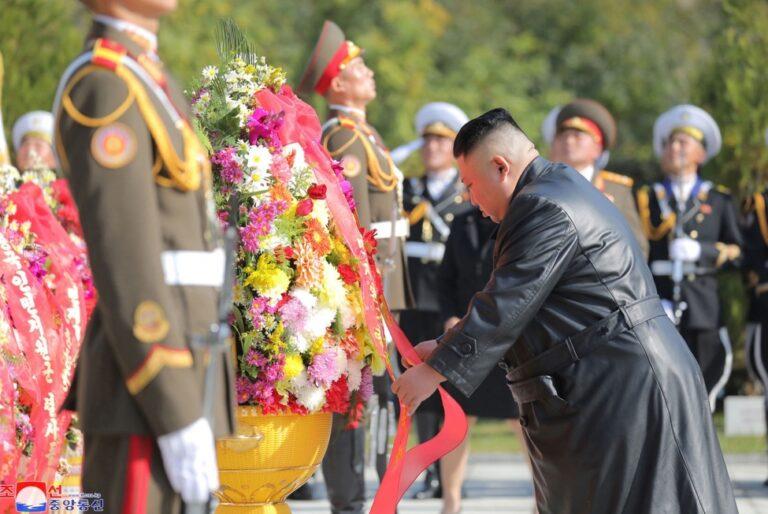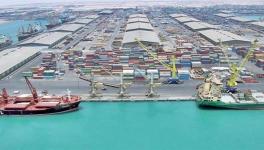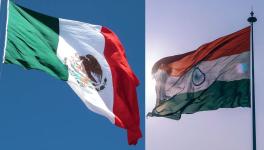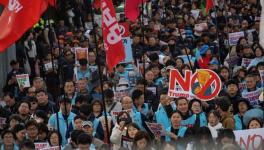China Draws Korean War Analogy to Warn US

North Korean leader Kim Jong Un (R) placing wreath at monument to martyrs of Chinese People’s Volunteer Army who fought in Korean War. Kim separately placed a floral basket at the tomb of Mao Anying, eldest son of China’s Mao Zedong, Hoechang County, DPRK, Oct 22, 2020.
The ceremony at the Great Hall of the People in Beijing on October 22 to commemorate the seventieth anniversary of China’s entry into the Korean War turned out to be a major event in regional politics. In a speech on the occasion, President Xi Jinping made his strongest ever remarks about the United States, indirectly hinting that China’s resolve to stand up to US belligerence is not to be doubted.
Xinhua news agency in a commentary said “Xi’s speech demonstrates China’s firm stance and resolve to protect territorial sovereignty and unity, safeguard regional and world peace and stability, and promote the building of a community with a shared future for humanity.”
The commentary said, “Arrogance, always doing as one pleases, acts of hegemony, overbearance or bullying will lead nowhere and surely result in a dead end in today’s world, as Xi said in his speech. This is a lesson some politicians in the West must keep in mind when they try to blackmail, block and exert maximum pressure on China.”
Xi made these remarks in the backdrop of rising tensions over Taiwan and the Trump administration’s shift to a more confrontational stance against Beijing. The US-China tensions over Taiwan are a spillover from the American intervention in China’s civil war in the 1940s and date back to 1949, when the Communists defeated Chiang Kai-shek’s Nationalists and chased them off the Chinese mainland to the island.
The scale of the ceremony in Beijing on October 22 underscores that the reset of the China-DPRK relations has been successfully accomplished and rests today on a stable and predictable footing. China moved decisively to repair relations with North Korea through an unprecedented series of summit level meetings leading to the first visit by a Chinese leader to North Korea in fourteen years in June 2019 when Xi Jinping was accorded a huge welcome in Pyongyang.
Clearly, China’s stance on the situation around North Korea has shifted. All indications are that Beijing is prepared to live with a nuclear DPRK. This can only mean that the US-China convergence on the common goal of North Korea’s denuclearisation no longer exists. The tectonic plates are shifting in the geopolitics of Northeast Asia.
The revitalised China-DPRK relationship means that the Trump administration can no longer count on Beijing to be a partner in the containment strategy against Pyongyang, characterised by increased sanctions and other pressures.
On the other hand, Pyongyang’s newfound “nuclear status” gives it the leverage it requires vis-a-vis other regional states. Japan and South Korea are directly affected. Xi’s remarks yesterday contained the implicit warning that China and North Korea will jointly face any outside aggression.
In a speech on “Chinese bad behaviour and Russian aggression” at the Atlantic Council on October 20, US Defence Secretary Mark Esper had said, “Chinese have built an extensive array of well over a thousand missiles, intermediate-range ballistic missiles, in the Pacific.” This is used as an alibi for US deployment of intermediate range missiles in South Korea and Japan.
To be sure, any such US deployment will be countered by Russia and China who have already warned the regional states. Reacting to the Pentagon announcement on October 20 that the Trump administration has approved the potential sales of three weapons systems to Taiwan at a total value of $1.8 billion, Chinese foreign ministry spokesman Zhao Lijian said yesterday that “China will make a legitimate and necessary reaction in the light of the development of the situation.” [Emphasis added]
But in the final analysis, President Xi’s remarks yesterday will bring attention to the Taiwan issue and its potential to erupt into a US-China conflict. Beijing is turning up the pressure on Taiwan question. The Chinese military has lately conducted exercises and drills unusually close to Taiwan, in the air and at sea. Last month, Beijing made clear that it does not recognise the existence of an unofficial boundary in the Taiwan Strait.
The outbreak of war remains a far-fetched scenario as of now, although tensions over Taiwan are unlikely to abate anytime soon, given the high probability that US-China relationship will remain sour. That means the risk of war — by accident or by design — is always there in the background.
The regional security situation is aggravated by the shifting regional balances with a resurgent China contesting the American primacy in Asia. The US-led post-World War 2 order has broken down. And there is geopolitical confusion as regards the tenacity of the American security system. Meanwhile, the coronavirus pandemic has badly rattled the US and it is mired in what is likely its worst economic crisis in living memory.
Indeed, miscalculations can occur if a feeling gains ground in the Chinese mind that with US encouragement, Taiwan under President Tsai Ing-wen, now in her second term, is drifting away under the notion of becoming a fully separate country. As was to be expected, Taiwan — not South China Sea — is becoming the ultimate test of American resolve to reign supreme in the Asia-Pacific.
The normalisation of China-DPRK relations poses a dual challenge for Washington, as US policymakers will have to figure out how to deal with a North Korea aligned with China, while at the same time contend with the emergent geopolitical reality that Taiwan is the seam in the American system most likely to split under the weight of Trump’s confrontational stance against Beijing.
Get the latest reports & analysis with people's perspective on Protests, movements & deep analytical videos, discussions of the current affairs in your Telegram app. Subscribe to NewsClick's Telegram channel & get Real-Time updates on stories, as they get published on our website.
























